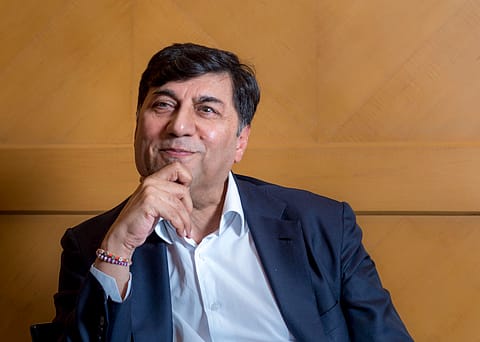Reckitt Benckiser keen to grow consumer health business in India
The UK-based health and hygiene company is open to acquiring brands or companies that will help expand its health and nutrition portfolio.

Reckitt Benckiser (RB), the Berkshire, UK-based company that specialises in health and home hygiene products is keen to expand its consumer health business in India through acquisitions, according to Rakesh Kapoor, RB’s chief executive officer.
In an exclusive interview with Fortune India during a recent visit to Mumbai, Kapoor (60) who has been leading the £11.5-billion multinational company since 2011, put all speculation to rest and categorically denied ever being in the race to acquire malt-based health drink brand Horlicks from GlaxoSmithKine (GSK). He also denied being interested in acquiring Complan, which its current owner Kraft-Heinz has also put on the block.
“I can categorically state that RB was never in the race for Horlicks. We can confirm that we aren’t in the race for Complan either,” Kapoor said. “We aren’t looking at these assets but that doesn’t rule out RB looking at other assets in the malt-based drinks space in the future.”
Kapoor elaborated that consumer health, including health food, had an important role to play in RB’s strategy and purpose. He expressed confidence that there would be further chances of consolidation in this space, given the fragmented nature of the market. “Many companies have a large consumer health portfolio and some of them will eventually decide that these assets no longer fit with their strategy,” Kapoor said.
RB has an impressive portfolio of products in India, including some ubiquitous brands such as Dettol (antiseptic hand-wash), Durex (condoms), Strepsils (lozenges for sore throat), and Harpic (toilet cleaners). However, the health food segment is a gap in its portfolio that RB is eager to plug.
The consumer healthcare market in India (of which health drinks like Horlicks and Complan are a part) was estimated to be worth ₹25,400 crore in 2017 and expected to grow to over ₹31,000 crore by 2020. With the purchasing power and awareness of Indian consumers on the rise, the preventive health and wellness market is expected to explode in India and several companies are seriously eyeing this space for future growth.
RB wants to make a large foray in the infant food and child nutrition, which is a sub-category of this market, in India, bolstered by the success brought about by the $17-billion acquisition of Mead Johnson in 2017. Mead Johnson, which makes and sells infant and child nutrition products under the Enfa family of brands, recorded sales of $3.7 billion in 2016.
Recommended Stories
While Mead Johnson has a small presence in India through the hospital channel, its brands aren’t yet available to consumers directly. However, that may change soon. “There is clearly an idea to make it (the Mead Johnson portfolio) sizeable over time. India records the largest number of births in the world and it is going to stay that way for a very long time. So if we are going to be successful, as a company, we have to be big in India,” Kapoor, who has been with RB since 1987, says. As and when RB introduces Mead Johnson’s products to Indian consumers over-the-counter, it will take on the likes of market leader Nestle – with products like Nan and Cerelac – and Abbott – with Pediasure – who are well-entrenched in this space.
But Kapoor, an alumnus of XLRI, Jamshedpur, was clear that, in the quest to grow the health food business in India, RB would not acquire a company or a brand at any cost. “We remain disciplined and have the courage to walk away from a transaction,”says Kapoor. “We don’t want to transact with a mind-set of scarcity, which can lead you to overpay.”
Certain news reports that emerged last month suggested that some FMCG companies like ITC had pulled out from the race to buy Horlicks and Complan, citing high valuations.
Meanwhile, despite challenges such as a depreciating rupee and high crude prices, RB expects its Indian operations to do well over the long term. Kapoor stated that post the introduction of GST (Goods and Service Tax), his company has passed on the cost benefit to consumers. But he indicated that the inflationary pressure may lead RB to take price hikes for some of its products. “We want to create a balance our costs and the price we can charge to the consumers,” he said.
(INR CR)
For 2018 (January-December), RB had guided for a 13-14% revenue growth, but Kapoor expects revenue from the company’s Indian operation to grow faster than that: In the mid to high teens,” he says. While RB’s India revenue isn’t publicly available, its turnover from developing markets (of which countries like India and China are part) stood at £3.26 billion in 2017.